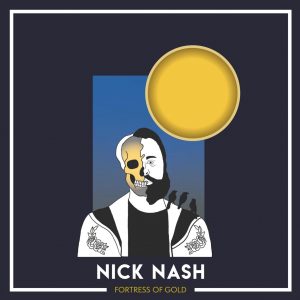Artist of the Week: Nick Nash’s ‘Fortress of Gold’ Inspires Reflection and Reconciliation
November 20, 2019
For University of Utah alumnus Nick Nash, music has been a constant force throughout his life. From his undergraduate career as a first-generation student to his current life post-law school, writing, making music and playing shows have consistently allowed him to explore deep emotional truths. His latest album “Fortress of Gold” was written as a letter to his young daughters and it delves into discussions of coping with big life changes and making tough decisions about moving forward in your career.
Nash, now living in Dallas, Texas, currently works as a corporate attorney. He’s still passionate about music, but said, “I just don’t get the chance to play as much as I used to. I’m at the office a lot and I work, and I kind of put my attention to that.”
Making the choice to focus on his work as an attorney presented a challenge for Nash, but ultimately, working as a lawyer proved to be the best choice for him and his family. “A lot of the album is to them [his daughters] to explain why I went to school, why I walked away from music and why I’m working as an attorney now,” Nash said.
The Legacy

While “Fortress of Gold” takes on a more somber tone, the messages presented in the album are necessary and are treated with care. In the first track off the album, “I Thought by Now,” Nash sings, “You can have everything and still feel like nothing.” With simplified backing instrumentals, Nash’s lyrics take center stage and call upon the listener to pay attention to the important messages of following your dreams and staying true to yourself.
In addition to his album being a method of explaining his choices to his daughters, Nash also hopes that this album will help others realize that they should pick up the phone and call someone if they’ve fallen out of touch. The track “Tennessee Rain” was written to express grief and regret. “I lost a family member that I thought I should have called more and been there for, but I kind of let them slip out of my life a little bit. So, if it makes someone sad enough to call someone or trigger that they should give someone a call that they think they should, I hope they do so,” Nash said. As the closing track, “Tennessee Rain” ends the album with melancholic energy, but the message of reaching out and trying to mend any relationships that you can leaves the listener with the chance to reflect upon their own interactions with family and friends.
In “Fortress of Gold,” Nash beautifully blends the genres of country, Americana and blues rock to build a landscape of emotional vulnerability and intimacy through brutality honest songwriting. Nash drew inspiration from “Gregory Alan Isakov, His Golden Messenger and Jay William Henderson.” Henderson actually helped to produce the album as well.
The Process

Nash wrote “Fortress of Gold” as he was in law school and touring across the country. “A lot of the album was written in Utah, Tennessee, Texas, Arkansas — I was all over when I was writing it, so I would have a lot of downtime between shows and I would just write the songs,” Nash said. In addition to this cross-country songwriting process, the production of the album also happened to traverse the U.S. Some of the recordings took place in North Salt Lake as Nash utilized some of his favorite local artists. Some orchestral elements were recorded in Los Angeles. Nash still stuck to his Utah roots and had several musicians from Utah contribute. Finally, the album was mixed in New York and Nashville, and mastered back in Los Angeles. Through this cross-country production, the western style that Nash leans towards feels authentic, and the production accurately reflects the sentiment of searching for identity and reconciling with certain choices that are discussed in the album itself.
With his Utah roots, however, Nash accredits much of his success to the U. “I graduated from the U a while ago, but my whole path was affected by that and the U is a huge role in everything I’ve done,” Nash said. While Nash is focusing more on his corporate job, music remains a constant in his life, and he is currently working on writing a new album that “should be a little bit happier and more upbeat.”
For Nash, music is consistently a means by which he is able to confront certain emotions and connect with others. He hopes to further continue these connections through his upcoming performance in Utah on Dec. 13, but other than that, his music is meant to inspire reflection and reconciliation.








